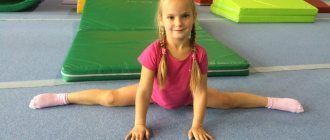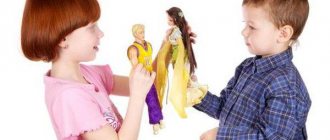Full text of the article:
Understanding the importance of a healthy lifestyle comes to a person over the years.
Not every one of us was taught from childhood to do exercises, eat healthy foods, play sports, monitor work and rest schedules, and we often begin to appreciate parental advice only with age. Of course, people who themselves have come to understand that health must be protected from childhood want to convey this idea to their children, but how can you explain to a child that for the sake of health in the future you need to limit yourself now? Forming an understanding of the principles of healthy lifestyle in children
- this is the task of parents, and this is not limited to nutrition issues.
Healthy lifestyle
is a broad concept, a kind of culture of human existence in society and nature. Parents must set an example for their children, so they need to influence, first of all, adults in order to find the way to the child’s heart through them.
Healthy lifestyle for preschool children
As you know, young children up to a certain age actually copy the behavioral characteristics of their parents, so experienced teachers can use the child’s behavior to understand whether he or she has problems in the family. It's the same with healthy lifestyle. In most cases, children are interested in their parents' hobbies and try to imitate them; their parents' opinion is also important to them, and parental authority is not questioned. You can rely on this if you decide to introduce your child to a healthy lifestyle. But you need to be aware that you won’t be able to stay away.
Do you want your child to be active? Then get up from the comfortable sofa and go for walks together
.
The children's goods market can now offer sports goods for every taste, from classic balls or frisbees to more complex and expensive cyclists, bicycles, scooters, snowboards, and children begin to be taught swimming before they take their first independent steps. Joint sports bring you closer together
, and what kind of sport it will be is up to you to decide.
In the first years of a child’s life, parents represent a large part of his world, then friends, classmates in kindergarten and classmates at school appear in this world. It will not be possible to protect your child from the influence of his peers, but if you remain an interesting conversationalist, partner and “collaborator” in his affairs, then you will be able to direct the child’s interests in the right direction in time and redirect his attention. Children need to be taught about the basics of a healthy lifestyle from an early age, but it should not be a dry theory with a set of rules and restrictions, because you always want to break the rules.
Formation of a healthy lifestyle for preschool children
“Taking care of health is the most important job of a teacher.
From the cheerfulness and vigor of children
their spiritual life depends
worldview, mental development,
strength of knowledge, self-confidence.
V. A. Sukhomlinsky
Life in the 21st century presents us with many new problems, among which the most pressing today is the problem of maintaining health and developing the habit of a healthy lifestyle. Our future is our children. Our Motherland will only be a strong, prosperous and competitive country when its younger generation is healthy.
Human health is influenced by a whole group of different factors - heredity, environmental conditions, and the level of development of medicine. However, the most significant factor is the lifestyle that a person follows. Fortunately, this is precisely the area that we can regulate ourselves. Ignoring the issue of a healthy lifestyle, as a rule, leads to the most disastrous results, when even the most powerful reserve of a child’s health is depleted and the person becomes hostage to various ailments.
The task of early formation of a culture of health is relevant, timely and quite complex. How to strengthen and maintain the health of our children? How to promote the formation of a child’s physical culture? How to instill healthy lifestyle skills? When should this start? Preschool age is decisive in the formation of the foundation of physical and mental health. After all, it is up to the age of seven that intensive development of organs and the formation of functional systems of the body occurs, the main personality traits are laid, and character is formed. It is important at this stage to form in children a base of knowledge and practical skills of a healthy lifestyle. Therefore, the priority direction in preschool education today is to increase the level of health of children, develop in them healthy lifestyle skills (HLS), as well as a sustainable need for regular physical exercise.
Today, preserving and strengthening children’s health is one of the main strategic objectives of the country’s development. It is regulated and ensured by such regulatory and legal documents as the Law of the Russian Federation “On Education” (Article 51), “On the Sanitary and Epidemiological Welfare of the Population”, as well as Decrees of the President of Russia “On Urgent Measures to Ensure the Health of the Population of the Russian Federation”, “ On approval of the main directions of state social policy to improve the situation of children in the Russian Federation”, etc.
Health is not only the absence of disease, it is a state of optimal performance, creative output, emotional tone, that which creates the foundation for the future well-being of an individual.
The study of children's health problems is of particular relevance in our time.
Goal: introducing children to a healthy lifestyle, organizing favorable conditions for the future formation of a healthy and physically strong personality, nurturing in children a creative attitude towards their health.
Tasks:
* Forming an understanding of the need to take care of your health, protect it, learn to be healthy and lead a healthy lifestyle.
*Education of cultural and hygienic skills.
*Formation in children of the need for a healthy lifestyle, the desire to preserve and strengthen health through physical education.
*Compliance with basic rules of healthy lifestyle.
The health of a preschooler is the most important issue that concerns parents of children aged 3 to 7 years. Health is a necessary condition for physical and mental development. Health is a basic value and a necessary condition for the full mental, physical and social development of a child. [3, p.34]. Therefore, the main tasks for improving the health of children in kindergarten are the formation of their ideas about health as one of the main values of life, the formation of a healthy lifestyle. Teachers must teach the child to make the right choice in any situation only that which is beneficial to health and to reject everything harmful, instill in the child from an early age the correct attitude towards his health, and instill a sense of responsibility for it. These tasks must be solved by creating a holistic system to preserve the physical, mental and social well-being of the child.
Without creating the foundation of health in preschool childhood, it is difficult to create health in the future. The foundation of health is created precisely in preschool age, and this is what doctors, educators, and parents should focus on. [1, p.47]. During this period, a restructuring of the functioning of various systems of the child’s body occurs, therefore it is extremely necessary to do everything possible to promote in children of this age the habits and needs for a healthy lifestyle, maintaining and strengthening their health. This is one of the priority tasks facing parents and educators. It is at this time that you need to begin forming the foundations of a healthy lifestyle for a preschooler. At the same time, character and habits are actively being formed, and the life priorities of the individual are being laid. [5, p.28]. That is why it is very, very important during these years to actively instill in children the basic knowledge, skills and habits of a healthy lifestyle in preschoolers.
In the modern educational process, the priority direction in the upbringing of preschool children is to increase the level of children’s health, develop healthy lifestyle skills, as well as foster the need for regular exercise and acquiring new knowledge. [7, p.31].
In our group we attach great importance to a healthy lifestyle. Starting from the second junior group, we strengthen children in the summer on the playground as part of integration through a variety of activities.
Parents show their children by their example how great it is to play sports.
Parents actively help us explore the ecological trail in kindergarten in winter.
Starting from the middle group, we go on mini-expeditions. Parents take an active part in this with great pleasure throughout the preschool period.
And every time more and more parents want to take part in our events.
Grandfathers and grandmothers take part in our mini-expeditions. And they do it with great pleasure. They show children an example of how to be active in order to become healthy. Here in the photo the grandmother is playing football with the children, and the grandfather is playing a game.
Parents are active participants in all sporting events. Thus, they show children that health is very important always and at any age.
Therefore, the task before adults, teachers and, first of all, parents is to form in a little person skills that will help preserve and strengthen the physical and mental health of the baby. Parents of a preschooler need to learn that the child’s health is not only the absence of illness, emotional tone and poor performance, but also laying the foundations for the future well-being of the child’s personality. [2, p.44]. Based on this, the main direction for improving the health of preschool children is the formation of preschoolers’ idea of health.
Kindergarten teachers and parents at home must constantly teach the child the correct behavior in various life circumstances and be prepared for unforeseen situations. [6, p.34]. During this period, the child must clearly understand what is good and useful, and what is harmful and bad. Parents and grandparents must constantly instill in their children the correct attitude towards their health and responsibility for it. This direction in the upbringing of a preschooler should be resolved by creating a holistic system for preserving the physical, mental and social well-being of the child. Parents need to pay special attention to the following components of a healthy lifestyle for preschoolers:
– Maintaining daily routine, activity and sleep.
– Physical activity, walks, outdoor games.
– Proper, healthy nutrition.
– Hardening.
Thus, it is necessary from an early age to introduce a child to a healthy lifestyle through family and public education, to develop in the child the skills of protecting personal health and caring for the health of others. [4, p.29]. Work in the stated direction gives good results, and has become quite traditional for our group. The formation of the foundations of a healthy lifestyle in preschoolers should be carried out constantly, without weekends and holidays. From infancy, a child must learn that being healthy is good and being sick is bad. To always be healthy, he must follow certain rules and not do things that could lead to illness or injury. The baby always follows the lifestyle of his elders, mom and dad. Therefore, parents, first of all, should lead a healthy lifestyle and not set a bad example for their child. Thus, an integrated approach to creating a culture of a healthy lifestyle in preschoolers will instill in them the necessary habits and skills that will be the basis for their future lives.
It is important to remember that a child is raised not only in a preschool setting, but also mainly in a family. And the family plays the main and decisive role in raising a full-fledged, healthy and comprehensively developed child.
Literature:
- Amosov, N.M. “Thoughts about health” / N.M. Amosov. – Kemerovo: Kemerovo Engineering Publishing House, 1981.
- Alyamovskaya V.G. “How to raise a healthy preschooler.” / Alyamovskaya V.G-M,: Prosveshcheni, 1995.
- Akhutina, T.V. Health-saving teaching technologies: an individual-oriented approach / Akhutina, T.V. // School of Health. – 2000 – P.42.
- Kasyanova, L.G. Formation of ideas about a healthy lifestyle in children of senior preschool age: abstract of dissertation of candidate of pedagogical sciences / L.G. Kasyanova // Ekaterinburg, 2004. – 22 p.
- L.V. Kochetkova. Improvement of children's health in a kindergarten. Moscow. Education. 5005
- Magazine "Preschool Education"
- T.A. Shorygin "Conversations about health." Toolkit. Creative, Moscow, 2004.
Healthy lifestyle rules for children
It is better to teach a child from childhood to live, observing the principles of a healthy lifestyle, but you need to try to make them seem natural and not imposed from the outside. Pay attention to the following aspects of your child's life:
- Daily regime
. It’s good if you managed to establish a certain routine in the house, and the child knows exactly when he should go to bed, get up, have breakfast or lunch, when there is time for games, and when he needs to complete some tasks around the house or school, but do not forget that the regime needs to be reviewed. The child grows, and his needs change, therefore, the daily routine must also change. Also, don't forget to take biological rhythms into account. If your child is a night owl, then you shouldn’t torture him with getting up early unless absolutely necessary; some tasks, including sports, can be moved to the evening. - Full sleep
. Many adults remember their childhood and “quiet hours” with nostalgia. The need for sleep also changes with age; small children under 5-6 years old are recommended to sleep about 10 hours a day; schoolchildren need 8-9 hours. You should try to provide your child with the opportunity to rest peacefully, but you should not force him to sleep. - Fresh air
. Children should breathe fresh air not only from the window. Walking is useful, and even if the weather is not pleasant, there is no need to cancel the walking promenade. If possible, you should walk in green areas, and not on noisy and dirty streets. Owners of country houses and summer cottages should think about arranging a sleeping area in the fresh air. where the child can rest. - Sports
. Setting sports records is given to a select few, but physical activity is beneficial for everyone; playing sports develops endurance, strengthens bones and muscles, helps control weight and burn extra calories. Perhaps in childhood the child will not realize the benefits of training, but the habit of playing sports will definitely be useful in the future. - Proper nutrition
. It can be very difficult to feed a child healthy food; when preparing a child’s diet, you can use the “smart plate” method. About half of the serving should be non-starchy vegetables: cucumbers, tomatoes, carrots, spinach, broccoli, etc. Another quarter is given to starch-containing products, this can be bread, porridge, corn, etc. The remaining quarter of the plate will be taken up by lean meat or fish. As a dessert, children will benefit from fruits and dairy products. This approach to feeding a child will help him receive the necessary vitamins and microelements for normal growth. - Control over mental and emotional state
. The emotional state of a child is strongly influenced by the situation in his family. If a child has to see parents quarrel and experience stress due to too strict rules, then he will grow up withdrawn and unsociable. Stress can also cause some childhood illnesses. In order for a child to grow and develop harmoniously, a friendly atmosphere must be maintained in the family, the child must feel love and support from adults. And remember that live communication cannot be replaced even by the most modern gadgets.
4. Social development of the child
We are born and live in society. It is impossible to live without human communication.
It’s not for nothing that we send our children to kindergartens from an early age. There, in addition to mental and physical development, the child learns to exist in the human environment.
Knowing how to communicate with other people is a whole science.
The look, facial expressions, timbre of voice, position of the body and hands can tell us a lot. We can understand whether this person wants to communicate with us now or not. We can feel the person who is evil now and the person who is kind.
A child should know the culture of communication from childhood. Must understand when and with whom he is talking. When is it okay to start a conversation and when is it better not to do so?
From an early age, a child learns to make friends. When entering a kindergarten group, children arrive alone. As a rule, almost every child plays by himself.
Why is this happening? Because while the child does not understand and does not know anything about society and how to deal with it.
Growing up, the child begins to look for a play partner. Children are trying to agree on something, for example, who will play with the car and who will play with the bucket and spatula.
As a result, children find friends. They learn to share toys and ask permission to take another child’s toy.
This is how the child subconsciously develops communication skills.
5.How to develop healthy lifestyle skills in preschool children
Only those parents who themselves lead a healthy lifestyle can develop healthy lifestyle skills in their children. And that's a fact.
If a mother leads a sedentary lifestyle, after work she runs not to the gym, but to the store for semi-finished products, then unfortunately, the child will develop exactly the same ideas about life.
If dad comes home from work and collapses on the sofa and watches TV all evening, then the little son will think that this is how adult life should be.
Therefore, to begin with, healthy lifestyle skills must be developed by parents.
Children copy mom and dad from a very early age. The way they speak and gesture—children absorb it like a sponge.
Why do children swear? Because they hear it from the environment. Why do children clink glasses after the weekend when they come to kindergarten for breakfast? Because that's how my parents spent their weekend.



